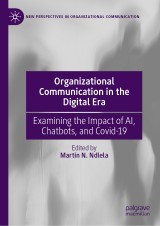Details

Organizational Communication in the Digital Era
Examining the Impact of AI, Chatbots, and Covid-19New Perspectives in Organizational Communication
|
192,59 € |
|
| Verlag: | Palgrave Macmillan |
| Format: | |
| Veröffentl.: | 31.07.2024 |
| ISBN/EAN: | 9783031583070 |
| Sprache: | englisch |
| Anzahl Seiten: | 300 |
Dieses eBook enthält ein Wasserzeichen.
Beschreibungen
<p>This edited collection examines different facets of organizational communication in the context of current technological developments and disruptions brought about by the COVID-19 pandemic. AI is making inroads in organizational communication practice, influencing how organizations communicate and interact with their environments. It drives, augments and supplements organizational communication. Chatbots, for example, are becoming increasingly relied upon by organizations, using them to manage basic communication tasks that used to belong solidly to the realm of human. Similarly, developments such as ChatGPT have attracted scholarly attention due to their perceived implications on various aspects of communication. All of this has a profound effect on human interactions and relationships in organizational settings. Filling a gap in scholarship around organizational communication in light of ongoing digital transformation processes and COVID-19 induced transformations, chapters provide an up-to-date account of how new communication technologies, especially AI, are transforming organizational communication. The contributions reflect upon the most current theory and practice in the field in the post-COVID era. Combining theory, applied scholarship and fresh case studies, this is a valuable resource that reflects on the new realities of today’s organizational environment.</p>
<p>Chapter 1. Ongoing Digital Transformation of Organizational Communication: An Introduction.- Section 1: Emerging Technologies And Organizational Communication.- Chapter 2. The Diffusion of Chatbot Research Across Disciplines: A Systematic Literature Review.- Chapter 3. Artificial intelligence in organizational communication: challenges, opportunities, and implications.- Chapter 4. Conversational AI in Organizational Communication.- Chapter 5. Role of Contemporary Communication Technologies for Listening to Stakeholders.- Chapter 6. Digital communication strategy and strategic communication in (inter)action: the Portuguese and the social media.- Chapter 7. Platform Communication and Big Data Sharing in Norwegian farming organizations.- Chapter 8. Communication in hot areas – technology and sign-systems for emergency first responders.- Section 2: Organizational Communication In The Covid And Post-Covid Era.- Chapter 9. From Forced Remote Work to Forced Office work? Factors Influencing Change in Willingness to Work Remotely.- Chapter 10. Internal Communications during Crisis-induced Organizational Change.- Chapter 11. The Communicative Constitution of Organizations in an era of re-materialization - A case study of three organizations.- Chapter 12: Norwegian Police Crisis Communication during the COVID-19 pandemic. Digital Opportunities and Challenges.- Chapter 13. From talent management towards talent engagement – responsiveness in a digitized post-Covid-19 strategic organisation.- Chapter 14. Communication for Stakeholder Leadership in the Post-pandemic Digital Era.- Chapter 15. Video Communication in the Post-Pandemic Era: Understanding the challenges and opportunities for the future of workplace communication.- Chapter 16. The digital communication of religious organizations: a case study of a Muslim Mosque.</p>
<p>Martin N. Ndlela is a Professor of Communication at Inland Norway School of Business and Social Sciences. He holds a PhD in media and communication from the University of Oslo. He is also Research Associate at the Department of Strategic Communication, University of Johannesburg. He researches and teaches courses on crisis communication, social media, digital communication and organizational communication. A prolific author, his recent publications include Risk and Crisis Communication during the Covid-19 pandemic, Global Pandemics and Media Ethics, Crisis Communication, and Social Media and Elections in Africa. Volume 1 & 2.</p>
<p>This edited collection examines different facets of organizational communication in the context of current technological developments and disruptions brought about by the COVID-19 pandemic. AI is making inroads in organizational communication practice, influencing how organizations communicate and interact with their environments. It drives, augments and supplements organizational communication. Chatbots, for example, are becoming increasingly relied upon by organizations, using them to manage basic communication tasks that used to belong solidly to the realm of human. Similarly, developments such as ChatGPT have attracted scholarly attention due to their perceived implications on various aspects of communication. All of this has a profound effect on human interactions and relationships in organizational settings. Filling a gap in scholarship around organizational communication in light of ongoing digital transformation processes and COVID-19 induced transformations, chapters provide an up-to-date account of how new communication technologies, especially AI, are transforming organizational communication. The contributions reflect upon the most current theory and practice in the field in the post-COVID era. Combining theory, applied scholarship and fresh case studies, this is a valuable resource that reflects on the new realities of today’s organizational environment.</p>
<p> </p>
<p><strong>Martin N. Ndlela</strong> is a Professor of Communication at Inland Norway School of Business and Social Sciences. He holds a PhD in media and communication from the University of Oslo. He is also Research Associate at the Department of Strategic Communication, University of Johannesburg. He researches and teaches courses on crisis communication, social media, digital communication and organizational communication. A prolific author, his recent publications include Risk and Crisis Communication during the Covid-19 pandemic, Global Pandemics and Media Ethics, Crisis Communication, and Social Media and Elections in Africa. Volume 1 & 2.</p>
<p> </p>
<p><strong>Martin N. Ndlela</strong> is a Professor of Communication at Inland Norway School of Business and Social Sciences. He holds a PhD in media and communication from the University of Oslo. He is also Research Associate at the Department of Strategic Communication, University of Johannesburg. He researches and teaches courses on crisis communication, social media, digital communication and organizational communication. A prolific author, his recent publications include Risk and Crisis Communication during the Covid-19 pandemic, Global Pandemics and Media Ethics, Crisis Communication, and Social Media and Elections in Africa. Volume 1 & 2.</p>
Examines organizational communication post-pandemic and in the context of current technological developments Explores opportunities and challenges with AI in organizational communication Offers global perspectives and international contributions
Diese Produkte könnten Sie auch interessieren:

Burnout und dessen betriebliche Auswirkungen. Anforderungen an das Personalmanagement in sozialen Organisationen

von: Carolin Wilczok

15,99 €















